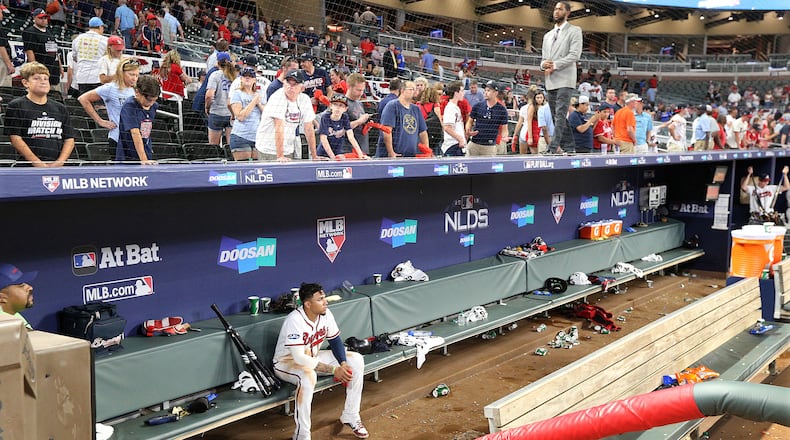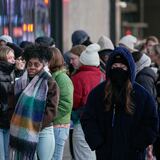For all the things this season was, the one thing it wasn’t was lightning in a bottle. At no point over the past seven months did we say, “There’s no way this is sustainable.” That was the best part of 2018 – the realization that this year, as sweet as it was, will give way to bigger and better.
What ended Monday night was – to borrow from Chicago, meaning the band with the horns and not the likewise eliminated Cubs – only the beginning. We just witnessed the birth of the Baby Braves. And babies grow up.
Here was Dodgers manager Dave Roberts, speaking after his team eliminated the Braves in Game 4: "Before I leave, I just want to congratulate the Braves on a tremendous season. Brian (Snitker) and his entire staff, the players, it was really fun to watch those guys compete this year and for us to be here in this great city and this fan base. It brought out the best in us, and we're going to be dealing with those guys more in the future, but I just want to congratulate those guys."
In the matter of budding greatness, Roberts has standing. His stolen base in the ninth inning of Game 4 of the 2004 ALCS against Mariano Rivera and the imperial Yankees lit the fuse for the greatest comeback ever, the one that saw the Red Sox override a 3-0 deficit and take Boston’s first title since 1918, a breakthrough that would, in 2007, be followed by another championship. He now presides over the Dodgers, who with their farm system and cash flow figure to be jousting with the Braves not just in October 2018, but for years to come.
The Braves weren’t quite a match for these Dodgers this time, but there will be other times. This is L.A.’s sixth postseason in succession; it was the Braves’ first since 2013. We saw over these four games the difference: The Dodgers scored 20 runs, 14 off homers; the Braves scored eight, half of those on one Ronald Acuna swing.
No one should have been surprised that Roberts’ club kept hitting the ball over the wall. This was the first National League team to field seven 20-homer men, and that’s not counting Manny Machado, who arrived from Baltimore in July and whose three-run blast off Chad Sobotka settled Game 4.
As Snitker said Monday: “They hit home runs. And that's, in the postseason, what carries teams because the pitching is so good that it's hard to bunch things together. That's why you can't walk people because it's multiple runs in when they (hit one). So they're a very powerful team. What they've done all year is hit home runs. And you know, we're not built like that yet.”
Key word: “Yet.” Nobody expected the Braves to be this good this soon. In the wake of John Coppolella’s ouster, it was even harder to know what was coming. Credit Alex Anthopoulos, who arrived as general manager in November, for resisting the urge to affix his stamp on the team he inherited. The new man spent the offseason and much of the season itself waiting, watching and evaluating. When he finally moved, it was in a measured way that safeguarded the future.
The Dodgers could sacrifice prospects to land Machado, who might turn out to be a three-month rental. They could stockpile guys like David Freese, whose pinch-hit single put them ahead to stay last night, just for a key at-bat in October. Anthopoulos – who’d worked for the Dodgers the past two years – grasps that the trick in baseball isn’t to build one team for one year, but to stock an organization capable of fielding good teams for many years. These Braves won 90 games. They’ll win more next time. They’ll break 100 soon enough.
Snitker: “We took a huge step forward this year. We had some very young players get a lot of great experience, both during the regular season and the postseason. And we have some really good players coming. I really am excited about the future of the Atlanta Braves right now with the young nucleus that we have here.”
The season just completed was, as noted last night, the end of the beginning. Coppolella's rebuild has born fruit. What comes next is Anthopoulos fleshing out this talent base. He can use the money cleared for 2019 in the Matt Kemp salary dump to pursue a Big Name in free agency. (Machado, maybe?) He can invest more in the bullpen, the area of greatest need. (Note that Daniel Winkler, Shane Carle, Sam Freeman, Jesse Biddle and Luke Jackson didn't make the NLDS roster.) He can trade Julio Teheran, whose time here is surely at its end, and clear rotation space for Mike Soroka, Touki Toussaint and maybe Max Fried and Kyle Wright.
Anthopoulos knows now he’s working from a position of strength. Of the everyday eight, nobody had a season that would appear beyond replication. (Though Nick Markakis is apt to leave.) As good as Acuna and Ozzie Albies were, they’re 20 and 21, respectively. There’s no reason to believe they’ve close to topping out. There’s every reason to believe they’re even better than advertised, which is really saying something.
There are no happy endings in October if you don’t win your last game, but Monday’s was about the happiest loss imaginable. These Braves took us all on a ride, and it’s a ride that should extend for many more miles and years.
The Astros and Cubs got bad so they could get good, and the two have combined for seven playoff appearances – and two World Series titles, with a third maybe coming this month – over the past four years. The Braves did the same, and here they are. They didn’t just ride the lightning. They have become the lightning.
About the Author


